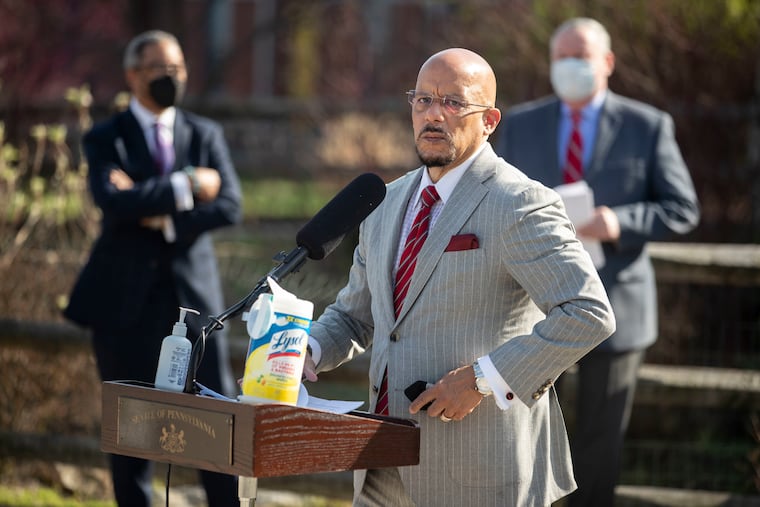To honor Dr. King, fully fund Pa. schools, officials say
“Education is the only way out,” Mayor Jim Kenney said. “It is the only way for poor people to stop being poor.”

Fifty-three years and a day after the Rev. Dr. Martin Luther King Jr. was assassinated, a group of area educators, students, and politicians gathered in front of the East Germantown high school named for him and demanded better for Pennsylvania’s students.
Nasharie Stewart, a student at Penn Wood High School in Delaware County, has learned in overcrowded classrooms, from old textbooks with pages missing. One day, she was sitting in a class when a water pipe burst above her head. She was shocked when she visited another school in a wealthier district and saw young people learning in brand-new buildings, with small classes and ample materials.
“You could feel the difference, and you can’t help but ask, ‘Why not us?’” Stewart asked Monday during a news conference highlighting funding inequities in Pennsylvania schools and calling on the state legislature to pass a budget that would pump $1.3 billion in new education funding into schools across the commonwealth.
Per-pupil funding in Philadelphia is about $15,000, said State Sen. Vincent Hughes, the event’s organizer. In Radnor, it’s about $24,000.
“Education in Pennsylvania is funded separately and unequally,” Hughes said. “There are two separate school systems in Pennsylvania.”
Mayor Jim Kenney said the increased funding would go a long way toward solving problems of gun violence, drug addiction, and poverty.
“Education is the only way out,” Kenney said at the news conference, which drew dozens to Martin Luther King High School. “It is the only way for poor people to stop being poor.”
Pennsylvania has some of the largest funding gaps between wealthy and poor school districts in the U.S., education research shows; those gaps mirror academic gulfs between the school systems, generally. One recent analysis said poor students in the state are being shortchanged by $4.6 billion.
Josh Shapiro, Pennsylvania’s attorney general, said the $7,800 gap in poor and well-resourced districts “makes no sense” and is, in fact, illegal.
“That is not thorough and efficient. I would argue it’s not even constitutional. We need to do better for our children,” Shapiro said.
The call is timely: A judge just set a September trial date for a landmark school-funding lawsuit. The suit, filed in 2014 by a group of school systems, parents, and agencies, says Pennsylvania fails to meet its constitutional obligation to adequately educate all students, with children in poor districts lacking much of what their peers in better-resourced communities have.
Those who spoke at King High School Monday said Gov. Tom Wolf’s proposed 2021-22 budget would go a ways toward making things more fair. The governor wants to run all basic education funding through a fair-funding formula that considers a district’s poverty level and other factors. Now, just a fraction of state dollars is allocated through that formula, disadvantaging Philadelphia and other low-wealth districts.
» READ MORE: Wolf’s school funding plan would help Philly. It would give big increases to some wealthier suburban districts, too.
Wolf’s plan would include increases in basic education funding for all school systems, not just struggling ones. But it faces an uphill battle in the Republican-controlled legislature.
Jerry Jordan, president of the Philadelphia Federation of Teachers, said the call was urgent.
“We’re sick and tired of having to fight for education funding that is actually a basic human right,” Jordan said. “We’re sick and tired of cries of, ‘There’s no money.’ We’re sick and tired of begging for the bare minimum for our young people.”
Cailin Stringer, a Martin Luther King High senior, is new to the school: She used to attend a school out of state. Her old school had things King students can’t even dream of, like “a library, overstuffed with books,” Stringer said. Like abundant computer labs.
At King, she said, “we are lacking in resources that are mandatory.”
Benjamin Hover, a Central High teacher, said his students are amazing, but make miracles happen despite large classes and inadequate supplies.
“Imagine what we can do with equal and equitable funding,” Hover said. “Imagine what they can do with equal and equitable funding. Together, we ask, we implore, we demand: Fund our facilities, fund our schools, fund us fairly.”